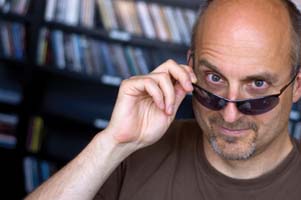Alumni > Alumni Profiles
Marty Riemer
Meet Marty Riemer – Master of Radio & Visual Media
 If you live in the Seattle area, you’ve most likely listened to the 7:20 a.m. or 5:20 p.m. “Funny” on 103.7 The Mountain — short comedy routines that make rush-hour commutes a bit more bearable. These entertaining interludes are brought to you by Electrical Engineering alumnus Marty Riemer (BSEE ’84, MSEE ’89). He is the creator of the “Funnys” and host of The Marty Riemer Show, weekdays from 5:30–9:00 a.m. on The Mountain.
If you live in the Seattle area, you’ve most likely listened to the 7:20 a.m. or 5:20 p.m. “Funny” on 103.7 The Mountain — short comedy routines that make rush-hour commutes a bit more bearable. These entertaining interludes are brought to you by Electrical Engineering alumnus Marty Riemer (BSEE ’84, MSEE ’89). He is the creator of the “Funnys” and host of The Marty Riemer Show, weekdays from 5:30–9:00 a.m. on The Mountain.
As an undergraduate, Riemer worked part-time at the UW radio station, KCMU. “The station had few listeners and even fewer students interested in working there because it played ‘heavy metal’ or what would now be considered ‘classic rock,’” Riemer recalls. In fact, the entire broadcast division of the communications department was in jeopardy of being eliminated, the radio station along with it. Riemer and a few other students ingeniously changed the genre to alternative and played progressive new artists, which saved the station and shaped it into today’s successful, listener-supported KEXP.
While pursuing his MSEE, Riemer worked part-time at Seattle stations KZOK and KJR. He recalls that his EE advisor, Mark Damborg, was supportive of his radio jobs, aware that the full tuition coverage, steady income, and free movie and concert tickets they supplied were ideal for a student.
"I most remember Marty’s cheerful enthusiasm, boundless energy, and humor,” Professor Emeritus Damborg says. "We found a project that was rather nontraditional, integrating engineering analysis software with databases. I think we both had a good time. It was a pleasure to have him as a student, and he put his UW experience to good use.”
It seems Riemer was genetically predisposed to study engineering; his father holds a doctorate in EE and spent much of his career at Boeing. Riemer’s older sister, who owns and operates a Scanning Electron Microscope analysis lab in Snohomish, Wash., earned her doctorate in material science from the UW. Riemer’s aptitude for engineering showed early, demonstrated by his problem-solving skills and technical acumen following his first encounter with radio at age 13.
On a drive to the Washington coast, his family stopped at a radio station near Aberdeen to visit some friends. “It made a huge impression on me. I was enthralled with the energy in the studio and fascinated by how the DJ, though alone, was interacting with thousands of unseen listeners. It was — and is — surreal,” recalls Riemer. He passed up the visit to the ocean to stay behind at the station for several hours.
Immediately after that experience, Riemer told his dad that he wanted to work at KGRG at Green River Community College in Auburn. His father wasn’t thrilled about the proposition, but agreed to let him pursue a volunteer position at the station, with one stipulation: he first had to obtain all three classes of commercial radio operator licenses so people would take the 13-year-old seriously. Apparently, only the basic third-class license, covering radio rules and regulations, would have been necessary. Second-class was required to operate, repair, and maintain a radio station while first class was required to operate, repair, and maintain a television station. With a clear propensity for the subject matter, Riemer earned all three licenses in just six months.
Riemer accepted an engineering position after receiving his MSEE, but six months later he was offered a full-time position at Seattle radio station KXRX 96.5FM — The X. He regards his decision to take the job as profound, decisively choosing to pursue his passion. “I credit engineering with providing me with the confidence that I could do anything,” Riemer says, “and I have always felt grateful for my EE degrees.”
After KXRX changed hands in 1995, Riemer launched a video production company called Twisted Scholar. “Visual media was the logical next step after so many years communicating via radio,” he says. “I couldn’t have created this company without my EE degrees. My education provided the technical skills to understand and operate video workstations that were truly on the cutting edge of film and video production at the time. Most of my competitors were intimidated by these new “black box” editing systems, whereas I financially couldn’t have afforded anything else. As a result, Twisted Scholar was established as a cost-effective, technically progressive production company.”
Marty lives in West Seattle with his wife, Karrie, and their two year-old daughter, Josephine.





